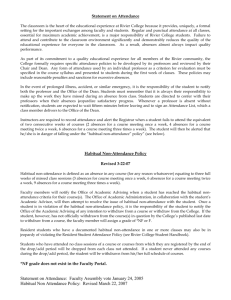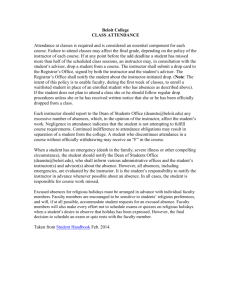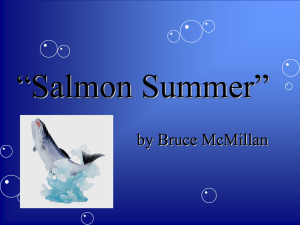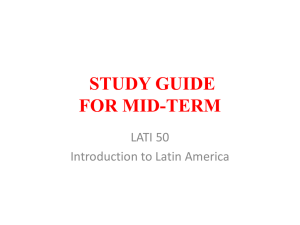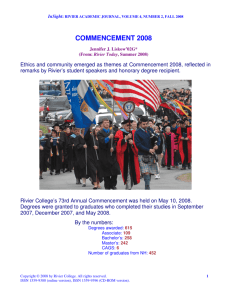Biol. 405 Seminar in Biology
advertisement
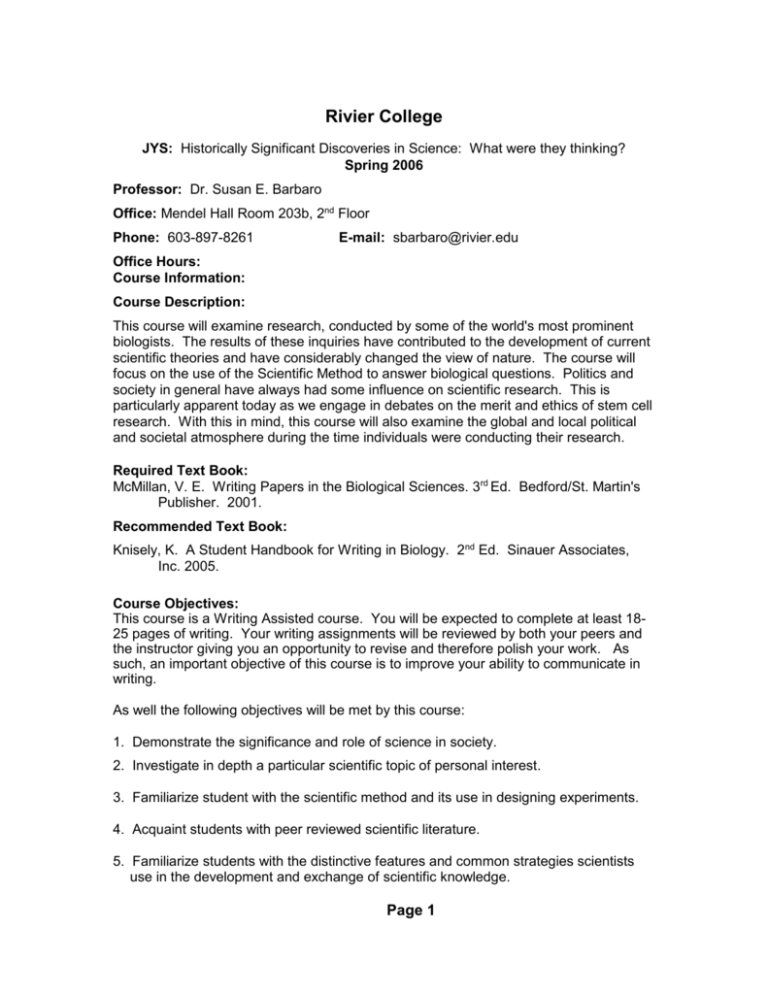
Rivier College JYS: Historically Significant Discoveries in Science: What were they thinking? Spring 2006 Professor: Dr. Susan E. Barbaro Office: Mendel Hall Room 203b, 2nd Floor Phone: 603-897-8261 E-mail: sbarbaro@rivier.edu Office Hours: Course Information: Course Description: This course will examine research, conducted by some of the world's most prominent biologists. The results of these inquiries have contributed to the development of current scientific theories and have considerably changed the view of nature. The course will focus on the use of the Scientific Method to answer biological questions. Politics and society in general have always had some influence on scientific research. This is particularly apparent today as we engage in debates on the merit and ethics of stem cell research. With this in mind, this course will also examine the global and local political and societal atmosphere during the time individuals were conducting their research. Required Text Book: McMillan, V. E. Writing Papers in the Biological Sciences. 3rd Ed. Bedford/St. Martin's Publisher. 2001. Recommended Text Book: Knisely, K. A Student Handbook for Writing in Biology. 2nd Ed. Sinauer Associates, Inc. 2005. Course Objectives: This course is a Writing Assisted course. You will be expected to complete at least 1825 pages of writing. Your writing assignments will be reviewed by both your peers and the instructor giving you an opportunity to revise and therefore polish your work. As such, an important objective of this course is to improve your ability to communicate in writing. As well the following objectives will be met by this course: 1. Demonstrate the significance and role of science in society. 2. Investigate in depth a particular scientific topic of personal interest. 3. Familiarize student with the scientific method and its use in designing experiments. 4. Acquaint students with peer reviewed scientific literature. 5. Familiarize students with the distinctive features and common strategies scientists use in the development and exchange of scientific knowledge. Page 1 Expected Learning Outcomes: Upon completion of this course, the student should be able to: 1. Critically evaluate research conducted by scientists whose work has led to significant discoveries. 2. Demonstrate an acquaintance with scientific literature by citing material pertinent to their area of investigation. 3. Use the skill of abstracting from scientific articles to support a specific argument or opinion. 4. Develop an ability to use and apply fundamental biological concepts in a critical and analytical way. 5. Demonstrate to peers oral and written communication skills in a scientific atmosphere. 6. Synthesize relevant information from previous courses in the development of a particular viewpoint. Teaching Strategies: The class will be taught through discussions and debates. These debates and discussions will center on historical scientific research conducted by investigators from all over the globe, specifically why it was conducted, how it was conducted, and its impact on society. Students will be responsible for moderating their own discussions and debates on a scientific topic of their choice. In addition, the student will be asked to write, present, and defend a scientific proposal. This will require the student to do some extensive research on their topic of choice and to propose an experimental procedure designed to answer a question related to their topic. It is expected that the student may conduct this research in a subsequent term under independent study. Course Requirements: 1. Students are guided in the selection of certain critical thought questions related to research that has led to significant changes in the way we understand nature. Students will prepare and present to the class an oral and written outline of research conducted by an individual whose work has impacted society. All participants will be asked to read appropriate material before the discussion in order to facilitate the exchange of ideas. This component is designed to sharpen the students' analytical skills and writing skills. 2. Students will select a content-oriented topic, perform an advanced literature search on that topic, propose a question related to that topic, outline an experimental procedure that could be used to answer the question, and defend their proposed research. This component is designed to sharpen the students' analytical, application, and writing skills. Page 2 HISTORICAL RESEARCH GUIDELINES: 1. Research must include background of the individual whose work is being presented. 2. Presentation must include an overview of the political and societal environment at the time the research was conducted. 3. Identify components of the scientific method used in the individuals study. 4. Report results of the research. 5. Discuss the impacts of the research on society. RESEARCH PROPOSAL GUIDELINES: 1. The proposal will include an extensive review of the past and current state of the field’s knowledge. In addition, students will be expected to assess the outcomes and limitations of individual studies that will be evaluated. 2. The scientific question to be explored and specific objectives of the proposed research must be clearly defined. 3. A thorough description and rationale of the methodology to be used in the proposed study. Class Room Policies: Serious students recognize that class commitments must assume high priority. The evidence clearly demonstrates that students in this course have the greatest potential for performing well if they attend all classes punctually and in their entirety. Absences from lectures may be excused if they have been documented in writing and cleared with the instructor. a) Excused absences do not exempt students assigned work; nor do they excuse them from adhering to deadlines unless specifically approved by the instructor. Specifically whether, and if so how and when, missed course components may be “made up” will be determined by the instructor. Therefore, if unavoidable conflicts arise, it is imperative that you inform your instructor before the scheduled lecture. When done in a timely fashion, it may be possible to avoid losing all credit for missed work. b) Failure to submit assignments when due will result in a penalty or total loss of credit for that work. For every day late the student will loose 5% of their total grade for that assignment. c) Participation is a valid parameter for use in student assessment. To receive credit for his/her participation, clearly a student must be present for (in both mind and body) and involved in class. Students who are absent from class or lab will receive a zero for their participation grade. Rivier College Statement on Attendance The classroom is the heart of the educational experience at Rivier College because it provides, uniquely, a formal setting for the important exchanges among faculty and students. Regular and punctual attendance at all classes, essential for maximum academic achievement, is a major responsibility of Rivier College students. Failure to Page 3 attend and contribute to the classroom environment significantly and demonstrably reduces the quality of the educational experience for everyone in the classroom. As a result, absences almost always impact quality performance. As part of its commitment to a quality educational experience for all members of the Rivier community, the College formally requires specific attendance policies to be developed by its professors and reviewed by their Chair and Dean. Any form of attendance used by an individual professor as a criterion for evaluation must be specified in the course syllabus and presented to students during the first week of classes. These policies may include reasonable penalties and sanctions for excessive absences. In the event of prolonged illness, accident, or similar emergency, it is the responsibility of the student to notify both the professor and the Office of the Dean. Students must remember that it is always their responsibility to make up the work they have missed during an absence from class. Students are directed to confer with their professors when their absences jeopardize satisfactory progress. Whenever a professor is absent without notification, students are expected to wait fifteen minutes before leaving and to sign an Attendance List, which a class member delivers to the Office of the Dean. Instructors are required to record attendance and alert the Registrar when a student fails to attend the equivalent of two consecutive weeks of courses (2 absences for a course meeting once a week, 4 absences for a course meeting twice a week, 6 absences for a course meeting three times a week). The student will then be alerted that he/she is in danger of falling under the “habitual non-attendance” policy” (see below). Habitual Non-Attendance Policy Habitual non-attendance of a course or courses will be considered academic misconduct subject to withdrawal from the course(s) not attended. Habitual nonattendance is defined as an absence in any course (for any reason whatsoever) equating to three full weeks of missed class sessions (3 absences for a course meeting once a week, 6 absences for a course meeting twice a week, 9 absences for a course meeting three times a week). It is the responsibility of the student to notify the College of any intention to withdraw from a course or withdraw from the College. The College will attempt to resolve the issue of habitual non-attendance with the student; however, the College reserves the right to withdraw students who are no longer attending courses. Habitual nonattendance in one or more classes may result in administrative withdrawal from the class or classes affected withdrawal from the College or, in cases with extenuating circumstances, an administrative leave of absence. In such cases a grade of W or NF will be assigned to the classes affected according to the appropriate date published in the academic calendar. Students who have attended no class sessions of a course or courses from which they are registered by the end of the drop/add period will be dropped from each class not Page 4 attended. If a student never attended any courses during the drop/add period, the student will be withdrawn from his/her full schedule of courses. Special Services: Americans with Disabilities Act (ADA) Rivier College wants to provide reasonable accommodations to students with disabilities. To accomplish this goal effectively and ensure the best use of our resources, timely notice of a disability must be provided to the Office of Special Services for verification and for evaluation of available options. Any student whose disabilities fall within ADA should inform the instructor within the first two weeks of the term of any special needs or equipment necessary to accomplish the requirement of the course. Evaluation Method and Grading: The College letter grade system will be used. Grades will be based on the following criteria: Participation: 15% Engaging in discussions and debates and asking questions. -5% Peer evaluations -5% for presentation evaluations -5% for historical research paper evaluations Presentation and Write up of Historical Research: 35% -25% write up, 10% presentation Mastery of content Ability to clearly present scientific findings Ability to engage audience in insightful discussions Interest and enthusiasm Presentation, Defense and Write up of Research Proposal: 50% -30% write up,10% presentation, 10% defense Mastery of content Mastery of the scientific method Proposal of sound experimental procedures Interest and enthusiasm Page 5 Tentative Course Schedule Week Date 1 Topic The Scientific Method Forms of Biological Writing Locating Biological Literature Readings and Assignment Due Dates Knisely, pg 1-8 McMillan, Chapter 10; Knisely, pg 19 McMillan, Chapter 1; Knisely, Chapter 2 2 Using Biological Literature Writing a Review Paper Significant Discoveries McMillan, Chapter 1 McMillan, Chapters 5 & 6; Chapter 3 Handouts from instructor. 3 Drafting and Revising Preparing the Final Draft Significant Discoveries McMillan, Chapter 7; Chapter 5 McMillan, Chapter 8 Handouts from instructor 4 Oral Presentations McMillan, Chapter 10; Knisely, Chapter 8 Creating a Power Point Presentation Knisley, Appendix 3 Significant Discoveries Handouts from instructor Historical Draft #1 Due-for instructor review 5 Historical-Oral Presentations 6 Historical-Oral Presentations 7 Historical-Oral Presentations 8 Research Proposals Writing a Research Paper McMillan, Chapter 10 McMillan, Chapter 4 Historical Assignment Due 10 Experimental Design Considering Ethics in Scientific Communication McMillan, Chapter 2; Knisley, Chapter 1 McMillan, Chapter 8 Research Proposal Draft #1 Due 11 Proposal Defense Examples Handouts from instructor 12 Research Defenses Research Proposal Draft #2 Due 13 Research Defenses 14 Research Defenses Historical Draft #2 Due-for peer review Research Proposal Final Due Page 6


